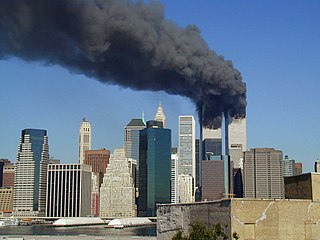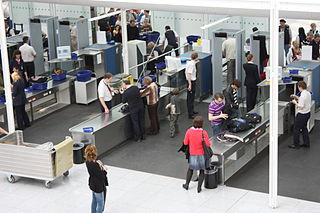
United Nations Security Council Resolution 1373, adopted unanimously on 28 September 2001, is a counterterrorism measure passed following the 11 September terrorist attacks on the United States. The resolution was adopted under Chapter VII of the United Nations Charter, and is therefore binding on all UN member states.

United Nations Security Council resolution 1566, adopted unanimously on 8 October 2004, after reaffirming resolutions 1267 (1999), 1373 (2001) and 1540 (2004), the Council condemned terrorism as a serious threat to peace and strengthened anti-terrorism legislation.
The ISIL (Da'esh) and Al-Qaida Sanctions Committee is a committee of the United Nations Security Council tasked with implementing international sanctions against the Islamic State and al-Qaeda. It was established as the Al-Qaida and Taliban Sanctions Committee on 15 October 1999, pursuant to Security Council Resolution 1267, which designated al-Qaeda and the Taliban as terrorist organizations. Following the creation of a separate Taliban Sanctions Committee on 17 June 2011, it was renamed the Al-Qaida Sanctions Committee. The scope of the sanctions regime was expanded to include the Islamic State on 17 December 2015 pursuant to Resolution 2253.

United Nations Security Council resolution 1189 was adopted unanimously on 13 August 1998. In the resolution, after expressing its deep disturbance at the bombings in Nairobi, Kenya, and Dar es Salaam, Tanzania, on 7 August 1998, the Council strongly condemned the terrorist attacks and called on countries to adopt measures to prevent further incidents.
United Nations Security Council resolution 1269, adopted unanimously on 19 October 1999, after expressing concern at the increasing number of acts of international terrorism, the Council condemned terrorist attacks and called upon states to fully implement anti-terrorist conventions. It was the first time the Security Council had addressed terrorism in a general manner, though it did not define what constituted terrorism.

United Nations Security Council resolution 1368, adopted unanimously on 12 September 2001, after expressing its determination to combat threats to international peace and security caused by acts of terrorism and recognising the right of individual and collective self-defense, the Council condemned the September 11 attacks in the United States.
United Nations Security Council resolution 1390, adopted unanimously on 16 January 2002, after recalling resolutions 1267 (1999), 1333 (2000), 1363 (2001), 1368 (2001), 1373 (2001) 1378 (2001) and 1383 (2001) concerning the situation in Afghanistan and terrorism, the Council imposed further sanctions on Osama bin Laden, Al-Qaeda, the Taliban and others associated with them.

United Nations Security Council resolution 1450, adopted on 13 December 2002, after reaffirming the principles of the United Nations Charter and resolutions 1189 (1998), 1269 (1999), 1368 (2001) and 1373 (2001), the Council condemned the attacks on Israeli targets in Kikambala and Mombasa, Kenya on 28 November 2002.

United Nations Security Council resolution 1455, adopted unanimously on 17 January 2003, after recalling resolutions 1267 (1999), 1333 (2000), 1363 (2001), 1373 (2001), 1390 (2001) and 1452 (2002) concerning Al-Qaeda, the Taliban and terrorism, the council improved the implementation of measures against the groups. It was the first Security Council resolution adopted in 2003.
United Nations Security Council resolution 1526, adopted unanimously on 30 January 2004, after recalling resolutions 1267 (1999), 1333 (2000), 1363 (2001), 1373 (2001), 1390 (2001), 1452 (2002) and 1455 (2003) concerning terrorism, the council tightened sanctions against Al-Qaeda, the Taliban, Osama bin Laden and associated individuals and groups.

United Nations Security Council resolution 1617, adopted unanimously on 29 July 2005, after recalling resolutions 1267 (1999), 1333 (2000), 1363 (2001), 1373 (2001), 1390 (2001), 1452 (2002), 1455 (2003), 1526 (2004) and 1566 (2004) concerning terrorism, the Council renewed sanctions against Al-Qaeda, the Taliban, Osama bin Laden and associated individuals and groups for a further seventeen months.

United Nations Security Council resolution 1624, adopted unanimously at the 2005 World Summit on 14 September 2005, after reaffirming previous resolutions on terrorism, including resolutions 1267 (1999), 1373 (2001), 1535 (2004), 1540 (2004), 1566 (2004) and 1617 (2005), the Council called on all states to co-operate in order to strengthen the security of their international borders by enhancing terrorist screening and passenger security procedures.

United Nations Security Council Resolution 1974, adopted unanimously on March 22, 2011, after recalling previous resolutions on Afghanistan, in particular 1917 (2010), the Council extended the mandate of the United Nations Assistance Mission in Afghanistan (UNAMA) for a period of one year until March 23, 2012.

United Nations Security Council Resolution 2199 was unanimously approved on 12 February 2015 to combat terrorism. Drafted by Russia, its legally binding provisions gave the fifteen nations of the United Nations Security Council authority to enforce decisions with economic sanctions. The resolution, in particular, emphasized "the need to combat by all means, in accordance with the Charter of the United Nations and international law, [...] threats to international peace and security caused by terrorist acts".
The United Nations Security Council adopted United Nations Security Council resolution 2235 (2015) on 7 August 2015, in response to use of chemical weapons in the Syrian Civil War. The resolution condemned "any use of any toxic chemical, such as chlorine, as a weapon in the Syrian Arab Republic" and expressed determination to identify and hold accountable those responsible for such acts. The resolution established a Joint Investigative Mechanism (JIM), a partnership between the United Nations (UN) and the Organisation for the Prohibition of Chemical Weapons (OPCW). The Security Council renewed the JIM's mandate in resolution 2319 (2016) on 17 November 2016, for a further period of one year.
Sa’d bin Sa’d Muhammad Shariyan Al Ka’bi is a known Qatari financier and facilitator of financial services that support the Qatari branch of Al-Qaeda, as well as Al-Nusra Front (ANF) for the People of the Levant (ANF), an al-Qaeda Syria based affiliate, which is listed by the United States as a terrorist group.

International sanctions against Afghanistan were implemented by the United Nations in November 1999. The sanctions were initially aimed at terrorists, Osama bin Laden and members of Al-Qaeda. The United States, the United Kingdom and the European Union also impose sanctions on Afghanistan.

United Nations Security Council Resolution 2388 condemned human trafficking, in particular by the Islamic State of Iraq and the Levant (IS), as well as human rights violations by various African terror groups. The resolution was passed in a 15–0 vote, unanimously adopted by members of United Nations Security Council (UNSC). on November 21, 2017.

United Nations Security Council Resolution 2195 was adopted unanimously by the UN Security Council on 19 December 2014. The resolution followed a debate initiated by Foreign Minister of Chad who explained the need to adopt international measures to prevent terrorists from benefiting from multi- national organized crime. This would include cases of arms trafficking, human trafficking, drug trafficking, using aircraft for illegal trade, trade in minerals, kidnapping, extortion and bank robberies. Countries of United nation members were asked to fortify guarding their borders in order to restrict the freedom of movement of terrorists.

United Nations Security Council Resolution 2253 was prepared by the United States and Russia and was unanimously adopted by the UN Security Council on 17 December 2015. The resolution specified that the sanctions that were already in force against Al Qaeda would also focus on the Islamic State in Iraq and to (ISIL/Da’esh). This resolution summed up the criteria according to which persons and organizations could end up on the sanctions list. Countries were also asked to take stricter action to cut off the financing of terrorist groups.














